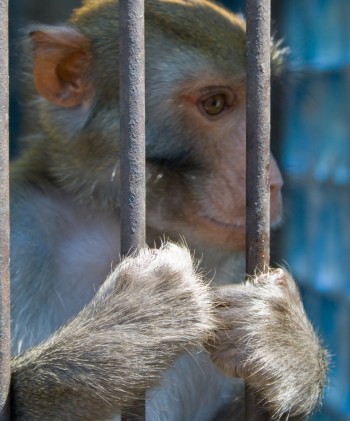 A recent Israeli Supreme Court decision has temporarily barred the shipment of 90 monkeys to research labs in the United States. Mazor Farm, where the monkeys are being farmed, must now provide documentation proving it operates within Israel’s legal framework for captive animals.
A recent Israeli Supreme Court decision has temporarily barred the shipment of 90 monkeys to research labs in the United States. Mazor Farm, where the monkeys are being farmed, must now provide documentation proving it operates within Israel’s legal framework for captive animals.
Many people imagine the typical Israeli farm as a peaceful, lush, agrarian landscape. In the case of Mazor Farm, they would be wrong.
Founded in 1991, this breeding facility for laboratory monkeys has become a primary target of Israel’s animal rights community. Mazor Farm receives monkeys caught in the wild predominantly from the island of Mauritius. These animals are then bred and the offspring sold to laboratories around the world for use in various types of research. The facility currently holds an estimated 1,500 long tailed macaque monkeys.
Let the Animals Live, an Israel-based animal rights group, petitioned the Israeli Supreme Court in March, asking it to overturn a Central District Court decision allowing Mazor Farm to export 90 female long-tailed macaques to Shin Nippon Biomedical Laboratories in Seattle.
At issue is a subtle question of Israeli law. Regulations permit animal export only for medical research whose goal is either to save human lives or reduce human suffering. The Israel Nature and Parks Authority, which issues the relevant export permits, told the court it plans to reexamine whether Mazor Farm’s application met the necessary criteria. The Israeli Supreme Court subsequently issued a temporary block of the export.
Additionally, it is illegal in Israel to trade in animals that are captured in the wild. Lawyers for Let the Animals Live argued that the 90 macaques in question had been taken from the wild.
And importantly, Environmental Defense Minister Gilad Erdan sided with the group. He sent a letter to the National Parks Authority expressing concern that Mazor Farm had not complied with Israel’s policy on primate export. He concluded by stating his belief that the country should end its trade in monkeys.
Israel is generally considered to be progressive in its animal welfare policies. It has banned many activities thought to be cruel, including animal dissections in elementary and secondary schools, performances by trained animals in circuses, and the production of foie gras.
Before the latter prohibition came into effect, Israel was the fourth largest producer of foie gras in the world. By enacting this ban, the government forfeited significant economic gains in the name of ethics. The Knesset has also banned animal poisoning, forced labor of physically unfit animals, and the practice of working animals to exhaustion.
In 2009, however, the Knesset rejected a bill that would have changed the name of the Animal Welfare Law to the Animal Rights Law. The coalition government largely opposed the bill, arguing that Israeli law does not recognize animals as legal entities with the same rights as humans.
Still, Israel’s animal welfare laws are more advanced than those of many countries. Most US states, for example, still allow the use of animals in circus performances and non-medical laboratory experiments.
Only time will tell how the court ultimately rules on Mazor Farm’s request to export macaques. As part of its reexamination, the Israel Nature and Parks Authority will require resubmission of information from the laboratory regarding the proposed research for which the macaques would be used. Government attorney Amir Levy emphasized the Authority’s intention to scrutinize “the unusual request to export for research purposes adult female monkeys that had been imported to Israel from the wild.”
As the fate of 90 macaques hangs in the balance, a protest movement demanding Mazor Farm’s closure is hitting its stride. The Facebook page for the movement has accumulated nearly 7,000 supporters. Several protests have been held around the country. And activists don’t appear ready to give up their ground any time soon.
Image of monkey from Shutterstock




Moms are the best!
A very well-written story from a long-time activist. Congrats!
Mom
I love it when moms comment!